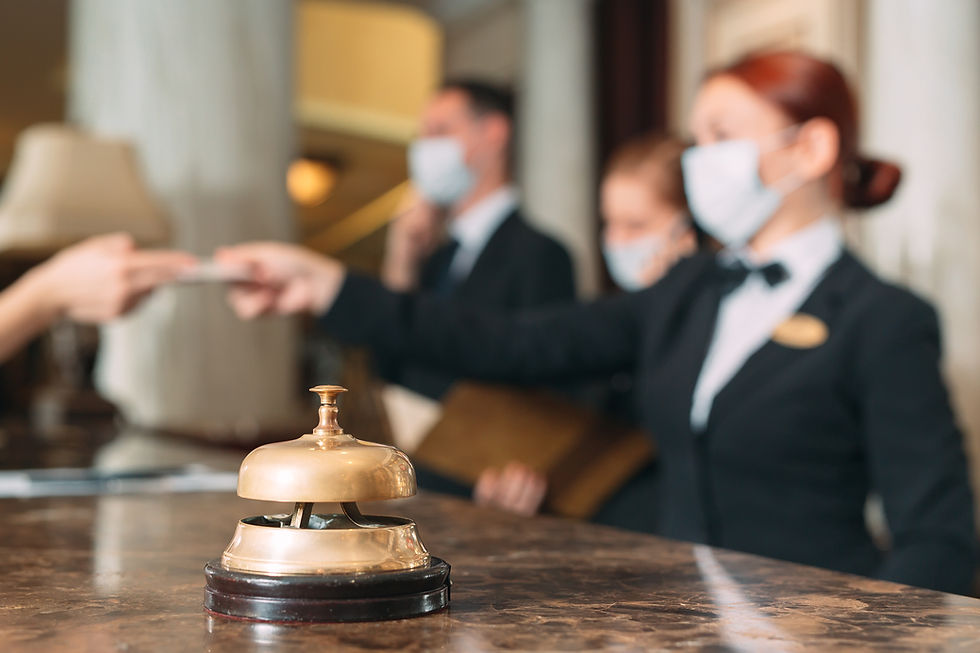10 Changes within Hotels During COVID-19
- Alena Makheja

- Sep 25, 2021
- 3 min read

In lieu of the recent global health pandemic, the hospitality industry has been impacted in
a number of ways. The decline in travel made hotels, restaurants, casinos, and sporting venues struggle to keep their doors open. However, with the summer travel incline and holiday season around the corner, hotels have been forced to cautiously reopen. The industry was forced to adopt new policies to ensure the safety of guests and employees, making many of these adjustments the new-normal for hospitality.
1. Cleanliness
a. In early May, the American Hotel & Lodging Association developed the
Safe Stay Guidelines to guarantee all employees and guests are healthy.
Housekeeping thoroughly cleans and disinfects all surfaces in the room to
ensure the cleanliness of the room is the least of the travelers’ concern.
2. Slow roll out of amenities
a. Amenities, such as the pools and gyms, are aspects of the hotel that many
guests look forward to, but, to guarantee them remaining available, there
must be new protocols. For instance, at the gym, a guest must schedule
times to use it so that the gym does not reach maximum capacity.
3. Technology
Though the hospitality industry prides itself on the interpersonal
interactions and strong customer relationships, moving many of the
personal touchpoints to technology has not only aided in the safety of the
guests and employees but it has also proven to be more cost effective. For
example, this new measure has allowed guests to check in mobily and
bypass the front desk, therefore promoting a safer environment but taking
away a traditional aspect of the customer service.
4. Food and beverage service
To accommodate social distancing and limit touch points, hotels have
removed breakfast buffets and food and beverage stations.Thought, in the
future, many experts predict seeing the return of buffets, but with hotel
employees serving the food rather than guests helping themselves. Hotels
are also transitioning to having their guests order food online and having
their guests pick up the meal outside their door instead of room service on
a cart.
5. Sticking to the essentials - limits touch points
Many hotels are removing the nonessential items in the hotel rooms, such
as notepads, menus, throw pillows, and magazines. This action eliminates
any unnecessary touch points and it also is more cost effective.
6. Flexibility in Space Planning
It has been necessary for hotels to rethink their layout in common spaces
to corroborate with the CDC guidelines. For example, hotels have opened
their interior lounging areas to accommodate the tables being six feet apart
and they began to utilize and extend the outdoor spaces.
7. Communication
Communication not only within the employees is essential but also with
the consumers to illustrate the new protocols. Employees must
communicate more than ever to make sure there is a balance between
guest experience and safety. Hotels can use social media to interact with
guests to highlight how they are able to guarantee the guest experience
while practicing their COVID-19 protocols.
8. Strengthening customer relationships in unprecedented ways
From extending loyalty programs to launching gift card programs, hotels
are working to encourage guests to invest in their future stays. Hotels are
making the effort to strengthen the customer relationship by adding the
personal touches in aspects they did not do previously, such as delivering
complimentary care packages as a part of the food and beverage takeaway.
9. Emphasis on Wellness
In an effort to find peace amidst the sterility of masks and sanitizers,
hotels have focused on creating a biophilic design through having green
walls, skylights, and open windows. This act increases the guest’s
connection to nature and allows for the fresh air and sunlight to become a
desirable design feature.
10. Transitioning to cleanable materials
a. With many hotels removing the nonessential furnishings and accessories
in the room, hotels are faced with the new obstacle of how to emulate the
residential feel in the room. For example, designers are changing from
carpet to hard flooring. The carpet is unhygienic, but can be classified as
more comfortable, so, as a solution, hotels have found area hugs to be a
balance.
Even though the Coronavirus will eventually dissolve, the hospitality industry must
ensure the guest experience and safety in order to preserve and strengthen the consumers’ trust for the future.
Comments